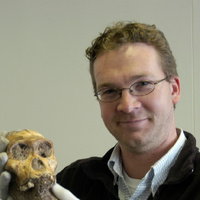Jeremy Desilva
Goodreads Author
Member Since
January 2021
More books by Jeremy Desilva…
“...Bipedalism in an overly aggressive ape with purely selfish tendencies and a low tolerance for other group member would have been a recipe for extinction.”
― First Steps: How Upright Walking Made Us Human
― First Steps: How Upright Walking Made Us Human
“As Rosenberg wrote, “Midwifery . . . is the ‘oldest profession.”
― First Steps: How Upright Walking Made Us Human
― First Steps: How Upright Walking Made Us Human
“Many organs in our bodies make molecules and release them into our bloodstream as a way to talk with other organs. These endocrine organs include the pancreas, the pituitary gland, the ovaries, and the testes. But few had thought of muscle as an endocrine organ until Pedersen’s work. Interleukin-6 was just the start. Scientists have now discovered over a hundred molecules that our muscles make and release into the blood as we walk. Pedersen’s team discovered that one of these, oncostatin M, shrank breast tissue tumors in mice and could be yet another reason why exercise is beneficial to humans with breast cancer. In 2003, Pedersen coined a name for this amazing family of molecules: myokines. As a myokine, interleukin-6 is an anti-inflammatory. Among other roles, it helps shut down the problematic tumor necrosis factor (TNF). It is the body’s natural ibuprofen. Pedersen’s team also discovered that interleukin-6 can mobilize cells called “natural killers” to attack and destroy cancerous tumors, at least in mice. For some reason, this myokine needs to be produced by muscles during exercise in order to work. But that does not require walking. Can the 3 million Americans in wheelchairs generate myokines? Yes. Researchers at the Department of Rehabilitation Medicine at Wakayama Medical University in Japan have discovered elevated interleukin-6 levels, and lowered tumor necrosis factor, after wheelchair half-marathons and basketball games. As Juliette Rizzo, 2005 Ms. Wheelchair America, said, “Walking is a way to get from A to B, and I do that.” Myokines, however, are not magic potions. They cannot be injected or swallowed. They are made only when the body is in motion, and in modern societies it often is not.”
― First Steps: How Upright Walking Made Us Human
― First Steps: How Upright Walking Made Us Human
 Goodreads Librarians Group
— 301115 members
— last activity 0 minutes ago
Goodreads Librarians Group
— 301115 members
— last activity 0 minutes ago
Goodreads Librarians are volunteers who help ensure the accuracy of information about books and authors in the Goodreads' catalog. The Goodreads Libra ...more







































